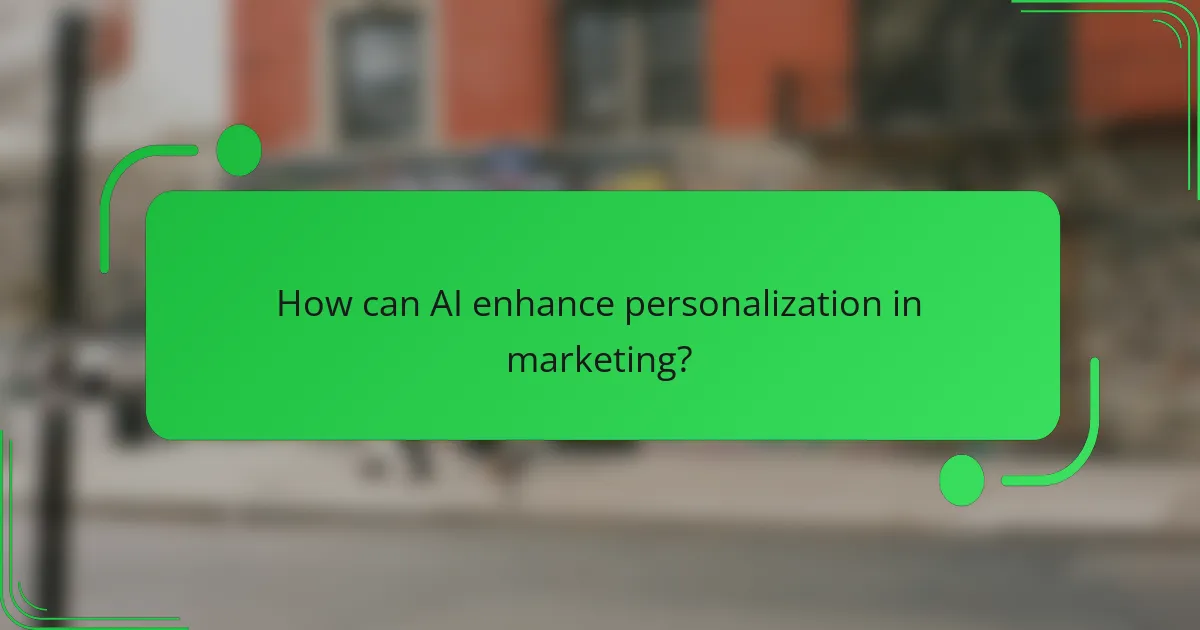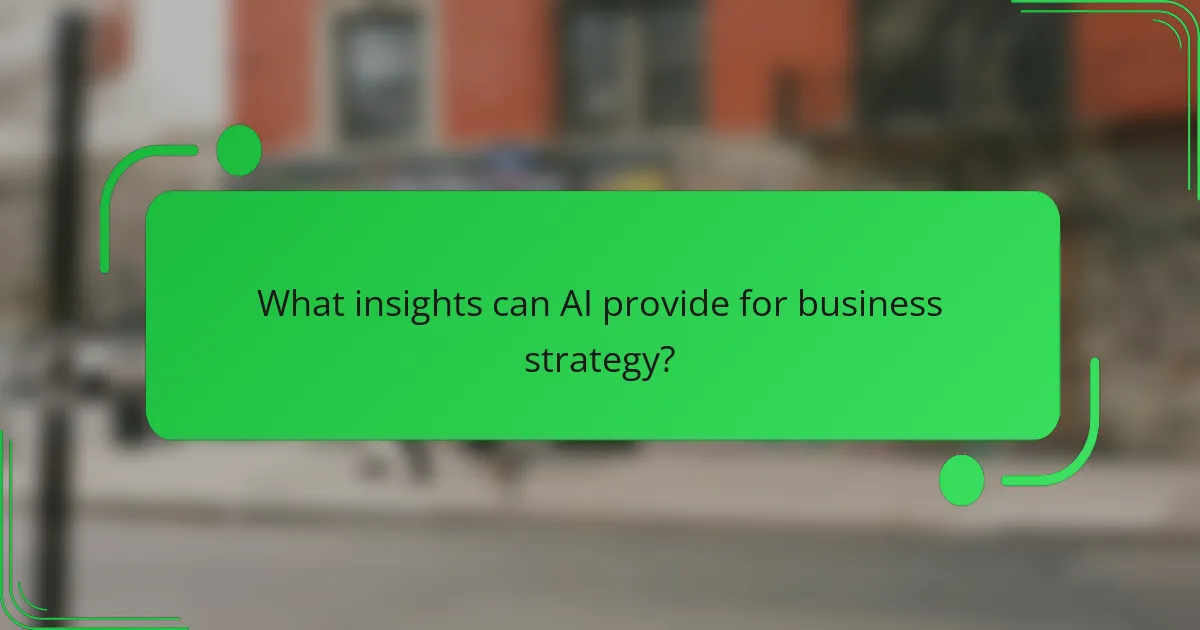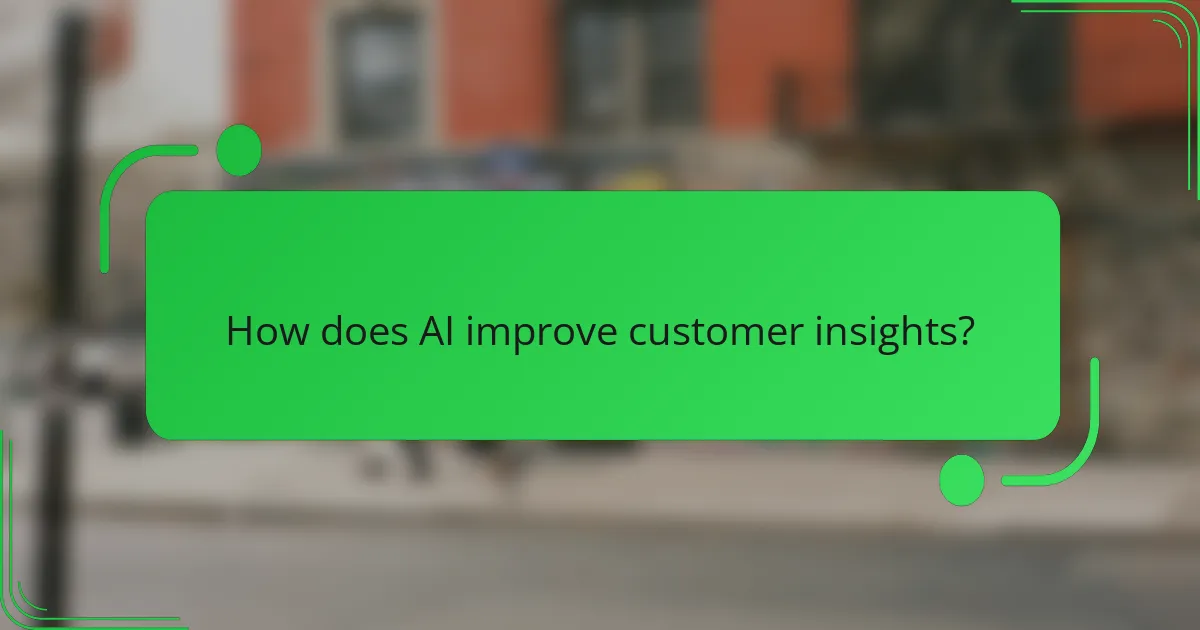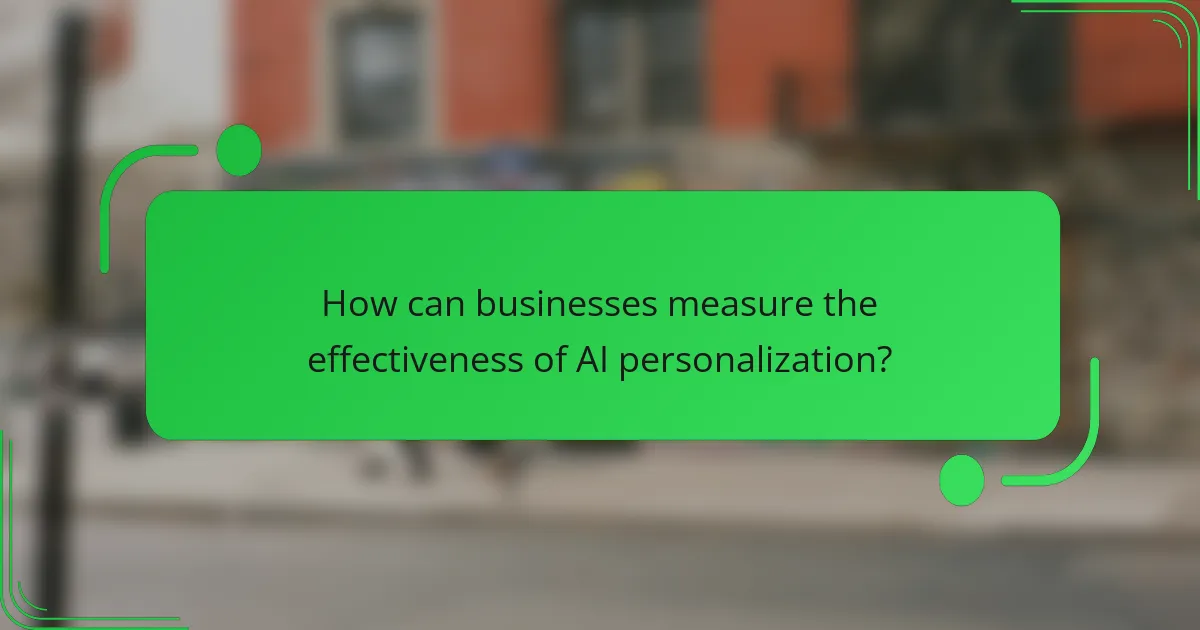AI is revolutionizing the way businesses approach personalization and strategy enhancement by leveraging customer data to create tailored experiences. By analyzing vast amounts of information, AI provides valuable insights that help organizations identify trends, optimize operations, and make informed decisions. This technology not only improves customer satisfaction through relevant interactions but also empowers businesses to implement targeted marketing strategies effectively.

How can AI enhance personalization in marketing?
AI enhances personalization in marketing by analyzing customer data to deliver tailored experiences. This technology enables businesses to understand individual preferences and behaviors, allowing for more relevant interactions and improved customer satisfaction.
Dynamic content recommendations
Dynamic content recommendations use AI algorithms to analyze user behavior and preferences in real-time, providing personalized suggestions. For instance, e-commerce platforms can display products based on a user’s browsing history, increasing the likelihood of conversion.
To implement dynamic recommendations effectively, businesses should ensure their data collection methods are robust and compliant with privacy regulations. Regularly updating algorithms based on customer feedback can also enhance accuracy and relevance.
Behavioral targeting techniques
Behavioral targeting techniques leverage AI to segment audiences based on their online activities, enabling marketers to deliver tailored ads. By analyzing data such as clicks, time spent on pages, and previous purchases, businesses can create highly personalized marketing campaigns.
Marketers should focus on creating diverse ad content that resonates with different segments. Testing various approaches can help identify which messages perform best, optimizing engagement and conversion rates.
Customer journey mapping
Customer journey mapping involves using AI to visualize and analyze the various touchpoints a customer experiences with a brand. This process helps identify pain points and opportunities for personalization throughout the customer lifecycle.
To create effective journey maps, businesses should gather data from multiple sources, including website analytics and customer feedback. Regularly revisiting and updating these maps ensures that marketing strategies remain aligned with evolving customer needs and preferences.

What insights can AI provide for business strategy?
AI can offer valuable insights that enhance business strategy by analyzing vast amounts of data to identify patterns and trends. These insights help organizations make informed decisions, optimize operations, and predict future market behaviors.
Predictive analytics for sales forecasting
Predictive analytics uses historical data and machine learning algorithms to forecast future sales trends. By analyzing past sales patterns, businesses can estimate future demand, allowing for better inventory management and resource allocation.
To implement predictive analytics effectively, companies should focus on collecting high-quality data and selecting appropriate algorithms. Common pitfalls include relying on insufficient data or failing to update models regularly, which can lead to inaccurate forecasts.
Market trend analysis
Market trend analysis involves examining data to identify shifts in consumer behavior, preferences, and emerging market opportunities. AI tools can process large datasets to uncover insights that may not be immediately visible, helping businesses stay ahead of competitors.
When conducting market trend analysis, it’s crucial to consider various data sources, including social media, sales data, and industry reports. Regularly updating your analysis ensures that your strategy remains relevant and responsive to changing market conditions.

Which AI tools are best for personalization?
The best AI tools for personalization focus on enhancing customer experiences by tailoring content and recommendations based on user data. These tools leverage machine learning algorithms to analyze behavior, preferences, and interactions, allowing businesses to deliver targeted marketing strategies effectively.
Adobe Experience Cloud
Adobe Experience Cloud offers a comprehensive suite of tools for personalization, including Adobe Analytics and Adobe Target. These tools enable businesses to collect and analyze customer data, create personalized experiences, and optimize marketing campaigns in real-time.
With features like automated A/B testing and audience segmentation, Adobe Experience Cloud helps marketers understand customer behavior and preferences. This allows for tailored content delivery, which can significantly enhance engagement and conversion rates.
Salesforce Einstein
Salesforce Einstein integrates AI capabilities directly into the Salesforce platform, providing personalized customer experiences across various touchpoints. It uses predictive analytics to recommend products and content based on individual customer profiles and past interactions.
By leveraging machine learning, Salesforce Einstein can automate customer segmentation and personalize marketing messages. This tool is particularly effective for businesses already using Salesforce, as it enhances existing CRM data with actionable insights.
HubSpot Marketing Hub
HubSpot Marketing Hub includes AI-driven features that allow for personalized email marketing, content recommendations, and lead nurturing. Its tools analyze user behavior to deliver tailored content and automate marketing workflows, improving customer engagement.
HubSpot’s user-friendly interface makes it accessible for businesses of all sizes. By utilizing its personalization capabilities, companies can create targeted campaigns that resonate with their audience, leading to higher conversion rates and customer loyalty.

What are the key criteria for selecting AI solutions?
When selecting AI solutions, it’s essential to consider factors such as integration capabilities and scalability. These criteria ensure that the chosen technology aligns with existing systems and can grow with your business needs.
Integration capabilities
Integration capabilities refer to how well an AI solution can connect with your current systems and workflows. A solution that seamlessly integrates with existing software can reduce implementation time and costs, enhancing overall efficiency.
Look for solutions that offer APIs, pre-built connectors, or support for common data formats. For instance, if your organization uses CRM software, ensure the AI tool can easily pull and analyze data from it without extensive customization.
Scalability of the solution
Scalability is the ability of an AI solution to handle increasing amounts of work or to be enlarged to accommodate growth. A scalable solution can adapt to changing business demands without requiring a complete overhaul.
Consider whether the AI solution can manage larger datasets or more complex tasks as your organization grows. For example, a cloud-based AI service often provides flexible pricing tiers that allow you to scale resources up or down based on your needs, making it a practical choice for many businesses.

How does AI improve customer insights?
AI enhances customer insights by analyzing vast amounts of data to identify patterns and trends that inform business strategies. By leveraging machine learning algorithms, companies can gain a deeper understanding of customer preferences and behaviors, leading to more targeted marketing and improved customer experiences.
Sentiment analysis from social media
Sentiment analysis uses AI to evaluate customer opinions expressed on social media platforms. By processing text data, AI can determine whether the sentiment is positive, negative, or neutral, providing businesses with a snapshot of public perception regarding their brand or products.
For effective sentiment analysis, companies should focus on key performance indicators such as engagement rates and sentiment scores. Tools like natural language processing (NLP) can automate this analysis, allowing businesses to quickly respond to customer feedback and adjust their strategies accordingly.
Customer feedback analysis
AI-driven customer feedback analysis involves examining survey responses, reviews, and other feedback sources to extract actionable insights. By categorizing feedback into themes, businesses can identify common issues and areas for improvement.
To maximize the benefits of customer feedback analysis, companies should regularly collect feedback through various channels, such as email surveys or in-app prompts. Integrating AI tools can help streamline this process, enabling quicker identification of trends and more effective decision-making.

What are the challenges of implementing AI in personalization?
Implementing AI in personalization presents several challenges, including data privacy concerns and high implementation costs. These obstacles can hinder organizations from fully leveraging AI’s potential to enhance customer experiences and drive business growth.
Data privacy concerns
Data privacy is a significant challenge when implementing AI for personalization, as it involves collecting and analyzing large amounts of personal information. Organizations must navigate complex regulations, such as the General Data Protection Regulation (GDPR) in Europe, which mandates strict guidelines on data usage and consent.
To address these concerns, companies should prioritize transparency with users about how their data is collected and used. Implementing robust data protection measures and ensuring compliance with relevant laws can help build trust and mitigate risks associated with data breaches.
High implementation costs
The costs associated with implementing AI for personalization can be substantial, often requiring significant investments in technology, infrastructure, and talent. Organizations may need to allocate budgets for advanced software, cloud services, and skilled personnel to manage AI systems effectively.
To manage these costs, businesses can start with pilot projects that focus on specific areas of personalization. This approach allows for testing and refining AI solutions before committing to larger-scale implementations, ultimately reducing financial risk while demonstrating potential ROI.

How can businesses measure the effectiveness of AI personalization?
Businesses can measure the effectiveness of AI personalization by analyzing key performance indicators (KPIs) such as conversion rates, customer engagement, and customer satisfaction. These metrics provide insights into how well personalized experiences resonate with users and drive desired actions.
Conversion rate tracking
Conversion rate tracking is essential for understanding the impact of AI personalization on customer behavior. By monitoring the percentage of visitors who complete a desired action, such as making a purchase or signing up for a newsletter, businesses can assess the effectiveness of their personalized strategies.
To effectively track conversion rates, businesses should set clear goals and utilize analytics tools to gather data. For example, a retailer might compare conversion rates before and after implementing personalized product recommendations to evaluate the strategy’s success. A typical conversion rate in e-commerce can range from 1% to 5%, depending on the industry.
Common pitfalls include failing to segment data properly or not accounting for external factors that may influence conversion rates. Businesses should regularly review their tracking methods and adjust their strategies based on performance data to optimize results.



